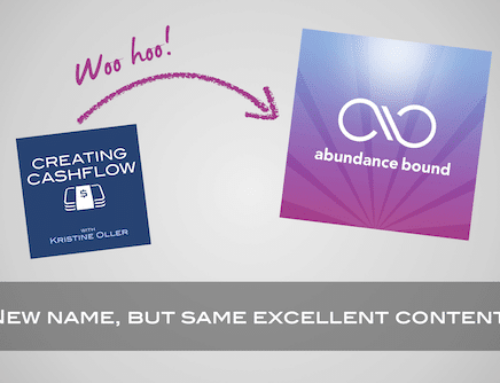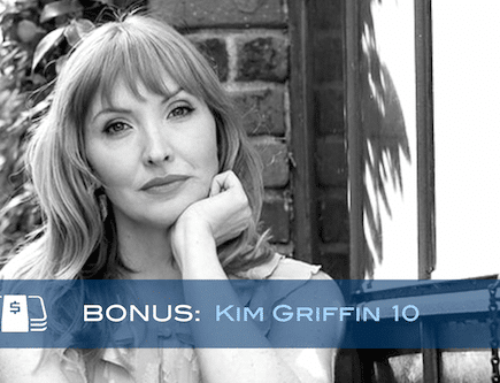Today we’re going to talk about time.
Currently we are living in a very strange time. We can’t really project forward and make predictions because we have no idea what the immediate future holds and we can’t really use “how things worked in the past” as a secure reference point… so planning is not that useful or comforting of a tool right now.
listen
To download the audio, click the little icon of the arrow in the square that’s right above.
2: A Time Out Of Time
Hi there, I’m Kristine Oller and this is Creating Cashflow episode two. Maybe you’re listening because you are excited about generating new streams of income or maybe you’re listening because circumstances have got you thinking that it might be time to learn how to employ yourself – either way, this podcast is here to help.
You’re back – I’m delighted.
Today we’re going to talk about time.
Currently we are living in a very strange time. The pandemic is something we are all experiencing together, and yet your personal experience of it may be very different from someone else’s because there are so many variables regarding how it may be impacting your physical health, mental health, finances, family, employment, emotions, etc.
Because of all these variables, I want to affirm to you that you are not “doing this pandemic wrong.” How could you be? There is no “right way” to “do” it. None of us have ever been confronted with these circumstances before. And depending on your circumstances, this may not be the ideal time to get in the best shape of your life or start that novel you’ve always wanted to write. Please allow yourself to release any pressure around making your experience match or fit into someone else’s experience of this year.
Right now, we are living in what I’m calling a time out of time. Meaning that this limbo period which started for most of us in March is a time in which the concepts of expectations and planning and linear results do not apply.
And if you like planning and result-oriented activity as much as I do, this time out of time – this liminal space feels disorienting. I’m quoting Alan Seale here, he wrote: “the word liminal comes from the Latin root, limen, which means “threshold.” So the liminal space is the ‘crossing over’ space” – we have left something behind, but we are not yet fully in the next, new space.
In our case, we have left behind the normal that we once new, but we don’t yet have a clear idea of when the gears of industries, the economy and our large institutions will start to turn again with some momentum and we have no clear idea of what the “new normal” of even he next three years will actually look like.
And this liminal time out of time of 2020 – which, in America, also includes a huge political transition – will very likely continue well into next year. So, judging yourself against any sort of usual timeline of productivity and progress is useless and, I think, detrimental to your well-being. As I am recording this, it has only been 5 months since life slammed itself into your life… having the expectation that you should be “bouncin’ back” “getting’ yourself back in gear” “gettin’ yourself up-and-running” “getting back in the game” at your normal speed is kind of ridiculous.
At the moment, we can’t really project forward and make predictions because we have no idea what the immediate future holds and we can’t really use “how things worked in the past” as a secure reference point, so multi-month planning ahead is not that useful or comforting of a tool right now.
And, I know, you may be so used to orienting your life along a timeline – “I’m going to do this by this deadline and then that will happen and then I do that and I’ll be done by the holidays.”
All I can say is: “Maybe. Who knows?”
So the question is what can you do within this time out of time – especially regarding creating some cashflow? You can take action. You can still plan your week. With that in mind, let me offer you four guidelines around taking action to help you make some cash during this weird time in the healthiest possible way:
Guideline #1: Acknowledge that you are not a robot.
Some of us… I’m not going to point any fingers cuz once upon a time this was me… some of us make plans as if we are robots – as if our energy levels and emotions do not fluctuate and our creativity is available to us on demand. We arrange our days and weeks and months and years on paper tightly and we assume that on the second week of the third month from now we WILL feel creatively and energetically able to pre-design a batch of 30 Instagram posts so they are ready to go for our launch. Maybe you will. But that’s a big assumption at anytime – and especially these days.
During this time out of time, we have to leave some breathing room in our thinking and our planning for our humanness and for for the fact that the snow globe that seems to be our life will likely be shaken up again – and again – throughout the rest of this year.
The next three guidelines that we’ll get to in a moment will address how to make some progress during this time as a human, but first I want to make sure you avoid doing what I call “Impossible Math.”
“Impossible math” is telling yourself that you can give your main job or creative career or family responsibilities 80% of your time, attention, and energy and give generating a new income stream 80% of your time, attention, and energy and give your personal life (including sleep) 80% of your time, attention, and energy.
That’s a total of 240%. But, as I know you know, in reality, you only ever have 100% of anything to divide up.
Telling yourself that you can give 240% creates an expectation that you’ll be able to keep everything in your life balanced and growing all at the same time. That you can just stuff your cashflow activities into the cracks of your all ready full life and magically make it work. And then, when these unrealistic expectations are not met, you get frustrated and feel defeated.
One reason you might be distracting yourself with “impossible math” is because you are afraid of acknowledging how much time and energy you realistically have right now to devote to creating some extra cashflow… you might be worried that the time you realistically have won’t be enough.
Please trust me when I say that – even if you only have 4 hours a month to work on creating a side biz, if you are using those 4 hours wisely, you can make consistent, profitable progress. Let’s carry that thought into…
Guideline #2: Take your income generation seriously – even if you aren’t yet generating income.
Before I had my first client as an organizer – before I made my first dollar as an organizer, I took myself seriously as an organizer. Once I decided to take the leap and try to create income as an organizer, I treated my idea like it was already a business. I made it important to me. I made it a priority. I decided to believe that it was possible. I shifted some things in my life to the back burner so that I could make room in my schedule for me to start taking a few baby steps forward.
When I told my generally supportive father that I was going to start trying to get work as a professional organizer, he said: “No one is going to pay you for that.” My dad wasn’t able to take my idea seriously until he got enough convincing proof that is was working. But this was before the internet, before Google so I couldn’t even show him that other people were out there doing this – I only knew of one other person who was doing it and it was some guy profiled in the one-page magazine article that I had just read that gave me the idea in the first place. The only way I could find out if I could create cashflow as an organizer was to start taking the same consistent, dedicated, professional action as someone who was creating cashflow as an organizer.
One way of taking your ability to generate a new stream of income seriously, is to have a little 15-minute business meeting with yourself on Sundays or Mondays to plan out the actions you’d like to take to move your idea forward in the week ahead.
Having a little planning session can relieve a lot of the anxiety that builds up in your head over the course of a week when you are trying to keep mental tabs on everything going on in your life. This meeting gives you a chance to calm down, take a step back, examine what happened last week, evaluate your progress, and decide consciously how you are going to move forward and best utilize the time that you have available to devote to your biz within the week ahead.
And reducing your anxiety is just one benefit of a weekly planning routine – there are four more big benefits that I share with you in a video that you are welcome to watch for free at kristineoller.com/weekly-planning-chart. (That link will also be in the show notes.)
On that page you can also download a free copy of my weekly planning chart –the video also explains how to use the chart. I created this chart many years ago for a client who was resistant to planning his week because had a very unpredictable schedule so his thought was “why bother planning if my plans could be obliterated at any moment?” I’ve had other clients resist weekly planning because they had so much space in their schedule that they felt they could just wing it and still make progress. But part of the reason they were working with me was because that wasn’t actually happening, so I introduced them to my chart as well. I encourage you to check it out and try it out because it just may be a terrific little tool to support you in taking action during this time out of time.
If you aren’t satisfied with how many hours you have available to devote to your little biz and really wish you could carve out more time for creating more cash, the book Essentialism by Greg McKeown will help you figure out what you can take off your plate completely, or what you can delegate to someone else, or what you can move to your back burner for awhile, or what boundaries you can put in place to protect your time and energy. It’s a quick read but packs a powerful punch. I’ve been re-reading it once a year since I first discovered it in 2015.
Guideline #3: Take effective action as suggested by the captain of the boat that you’ve chosen.
Okay, so you’ve determined, realistically, how much time you have per month or per week to devote to your cashflow project and you have committed to meeting with yourself on a regular basis to plan each week… so… how do you figure out what are the most effective actions for you to take so that you can utilize the time you have wisely?
That’s an excellent question.
Taking any action is better than not taking action. Because at least, if you are taking some sort of action, you will eventually stumble across things that really work for you. But this approach can feel like after every two steps forward you take three steps back.
Taking smart action is even better. When I meet most of my coaching and strategy clients for the first time, are already taking smart action. They are intelligent people and they have already identified many of the things they need to do to get where they want to go. But they’ve come to me because they aren’t progressing at the speed they desire. And the reason for that is because although they are making many of the right moves, they are often making them in the “wrong” order – or in a less effective order. This feels like every time you take two steps forward, you take one step back.
Effective action creates faster progress because your actions are both smart and strategic – meaning that each action you take builds upon the last one. With effective action you are consistently taking steps forward, one after the other, and every once in while you take a step back because, you know, you are human and not a robot.
The folks who can guide you toward effective action are usually folks who have been there and already done that. As I said in the last episode, many of these folks (like me) have built boats (also known as courses and communities) and they are willing and able share their guidance and resources with you. There’s no need for a smart, capable person like yourself to just bob around in the ocean letting the drift of the currents take you over here and then over there. Pick a boat and listen to the captain of your boat and commit to taking effective action on those days when you have the energy and wherewithal to do so.
Oh, I did I just hear you hollar: “Tell me all the actions to take! I want to know ALL THE THINGS TO DO. Tactics, tactics, tactics!”
I hear you. I do. And I respect and understand that desire. And tactics are coming in future episodes. But I am here on this podcast as a coach, not just as a teacher or deliverer of tools and tactics.
Do I want you to have a fabulous toolkit filled with exactly what you need? Yes. That’s why I wrote and recorded the Creating Cashflow course.
But just dumping random tools at your feet, podcast episode after podcast episode, doesn’t set you up for sustained success. As a coach, I’m interested in setting you up for success for the next ten years of your life, not just the next ten months or ten minutes.
Which is why, on this our second episode together we are discussing these four guidelines because understanding and applying these four guidelines will help you avoid burnout and exhaustion for the rest of your life. These four guidelines will help you implement all of the tactics that you ever learn in a healthy sustainable way. These four guidelines are keys to you being able to start creating cashflow during this time out of time.
So here’s the final guideline…
Guideline #4: Replace your timeline with texture.
For some folks, planning out a year creates an exciting sense of possibility. Planning out your year gives you something to focus on and maybe helps you feel more directed or grounded or purposeful.
At the moment, since we can’t make a rest-of-of-2020 plan to aim toward with any scrap of certainty, what do we organize our life around instead?
Well, instead of focusing on a following a timeline for the next few months, I recommend that you focus on creating a texture during the next few months. In other words, instead of measuring your achievement based on hitting deadlines and reaching goals, measure your achievement based on how close you get to embodying and surrounding yourself with the emotions and qualities that you want your life to have.
Let’s say, no matter what happens over the next few months, you are going to focus on shifting yourself and your environment and your relationships and your actions towards the texture of calm. When you take action, you’ll try your best to infuse those actions with the texture of calm.
(Or you could pick the texture of vitality, or surrender, or ownership of your worth, or flow, etc.)
To draw that chosen texture of calm into your life, what might need to shift? What might need to shift about the stories that you tell yourself when you get frustrated? What obligations, relationships, or issues might you need to let go of? To embody a texture of calm, what might need to shift within your worklife, your home life, when you’re interacting with colleagues, with loved ones, or with family?
As you already know, focusing on what’s out of your control or ability to predict feels disempowering and wastes precious energy. Instead, focusing on what is still within your sphere of influence – which is mainly your thoughts and your actions – makes you feel more empowered and hopeful – even while in limbo.
The point is, even though you can’t know or control where the world or your income or your business or your health will be six months from now, you can choose and shape the person you are six months from now and the textures in your life six months from now.
So, to recap – my four guidelines around taking action that will help you make some cash during this weird time in the healthiest possible way:
1) Acknowledge that you are not a robot.
2) Take your income generation seriously – even if you aren’t yet generating income.
3) Take effective action as suggested by the captain of the boat that you’ve chosen.
4) Replace your timeline with texture.
These are core things that you still have agency over during this strange moment of historical upheaval – and each one is an essential building block that will help you fund your future.
A link to the book Essentialism and a link to the page where you can download my weekly planning chart are in the show notes for this episode at KristineOller.com/podcast.
I appreciate that you spent this time with me and I wish you the very best.
———-
Creating Cashflow is a podcast, a course and a community that exists to guide and support you through the process of generating supplemental streams of income to help fund the life you want to live. We welcome those of you who are just starting out and we welcome those of you who have a biz but now want to make it as streamlined and profitable as possible. Three times each month I roll up my sleeves and do deep dive group coaching sessions with the Cashflow members to help them apply the info in the course to their specific circumstances.
A great place for you to start is with my free online workshop – Creating Cash When Times Are Tough. You can watch the video or listen to the audio or read the transcript. When you access this workshop you also access a page where you can buy the entire course at a very special price. That’s at KristineOller.com/cashflow.
The show notes for this episode are at KristineOller.com/podcasts
And if you feel inspired to share this episode with someone special, follow through on that inspired action!
featured
Featured:
Essentialism by Greg McKeown
Weekly Planning Chart w/video
Host:
Kristine Oller
Music:
Pictures of the Floating World
Photo:
Jon Tyson




